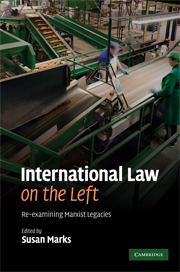Book contents
- Frontmatter
- Contents
- Contributors
- Acknowledgements
- Introduction
- 1 What should international lawyers learn from Karl Marx?
- 2 An outline of a Marxist course on public international law
- 3 The commodity-form theory of international law
- 4 Positivism versus self-determination: the contradictions of Soviet international law
- 5 Marxism and international law: perspectives for the American (twenty-first) century?
- 6 Toward a radical political economy critique of transnational economic law
- 7 Marxian insights for the human rights project
- 8 Marxian embraces (and de-couplings) in Upendra Baxi's human rights scholarship: a case study
- 9 Exploitation as an international legal concept
- Index
Introduction
Published online by Cambridge University Press: 07 September 2009
- Frontmatter
- Contents
- Contributors
- Acknowledgements
- Introduction
- 1 What should international lawyers learn from Karl Marx?
- 2 An outline of a Marxist course on public international law
- 3 The commodity-form theory of international law
- 4 Positivism versus self-determination: the contradictions of Soviet international law
- 5 Marxism and international law: perspectives for the American (twenty-first) century?
- 6 Toward a radical political economy critique of transnational economic law
- 7 Marxian insights for the human rights project
- 8 Marxian embraces (and de-couplings) in Upendra Baxi's human rights scholarship: a case study
- 9 Exploitation as an international legal concept
- Index
Summary
This book is concerned with the contemporary relevance of Marxism for the study of international law. As a general theme of theoretical investigation, this question of the ‘contemporary relevance of Marxism’ has become in recent years a staple of the social sciences and humanities. Against expectations that the turn away from state socialism would likewise initiate a turn away from Marxist thought, the trend has been rather the reverse. From one perspective, this is a strange paradox of our era of unrivalled capitalism. From another, it is a perfectly logical state of affairs, inasmuch as Karl Marx and his interpreters have produced some of the most sustained and penetrating analysis we have of capitalism as an economic system with globalising tendencies. Either way, the collapse of Eastern bloc communism clearly released the grip of orthodox Marxism as an unchallengeable body of doctrine, and created an opening for fresh consideration of Marxist texts by a new generation of readers. At the same time, the emergence in the succeeding decade of an oppositional politics that goes under the banner of ‘anti-capitalism’ added renewed impetus to the familiar Marxist enquiry into the character, limits and transformation of the capitalist mode of production.
Any effort to take stock of what Marxism has to offer today must reckon with a tradition that ranges across an immense array of disciplines, preoccupations and debates, and is at once distinctive and persistently plural.
- Type
- Chapter
- Information
- International Law on the LeftRe-examining Marxist Legacies, pp. 1 - 29Publisher: Cambridge University PressPrint publication year: 2008
- 1
- Cited by

